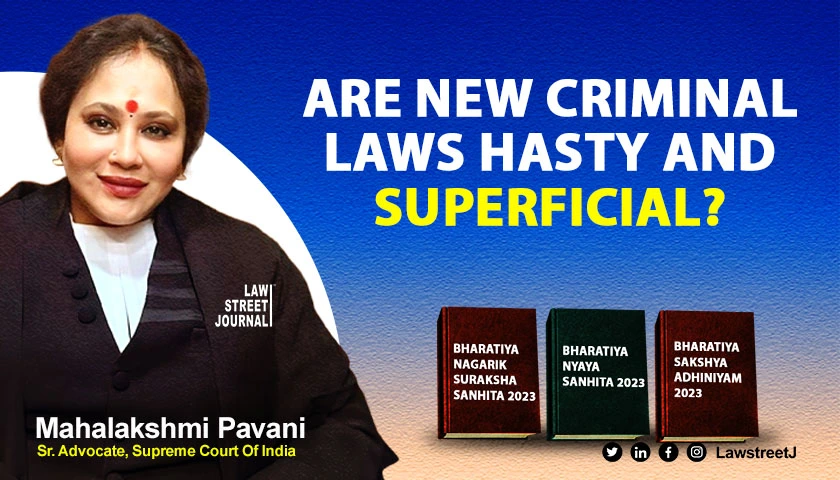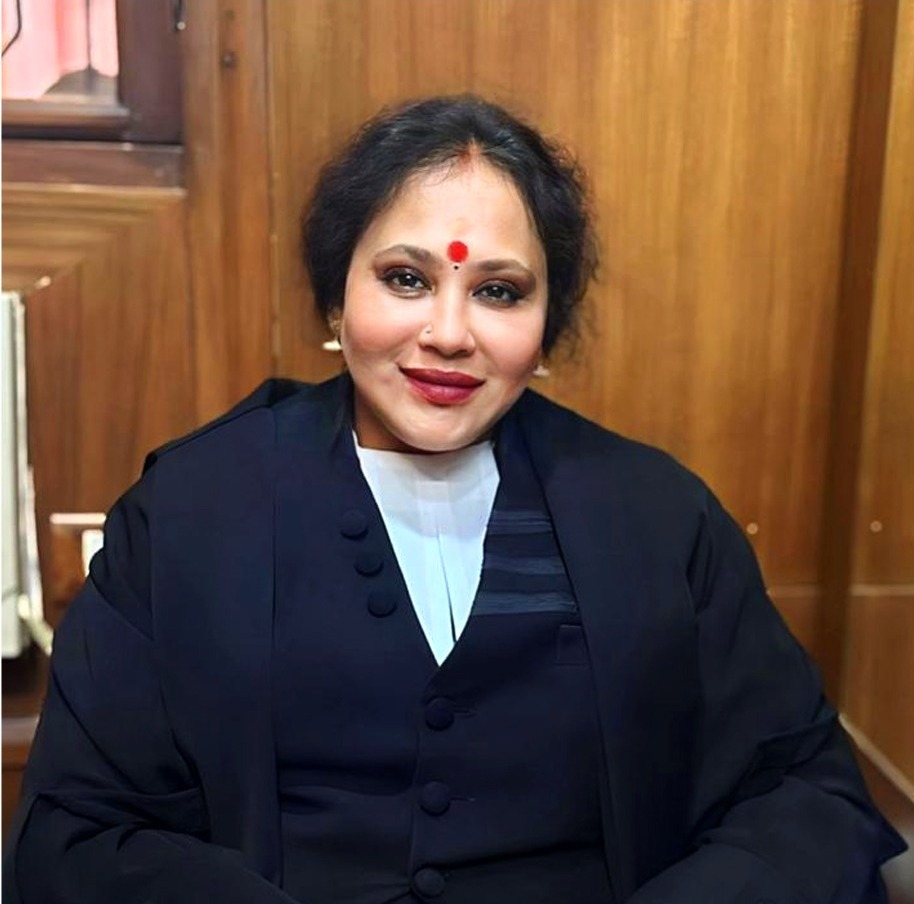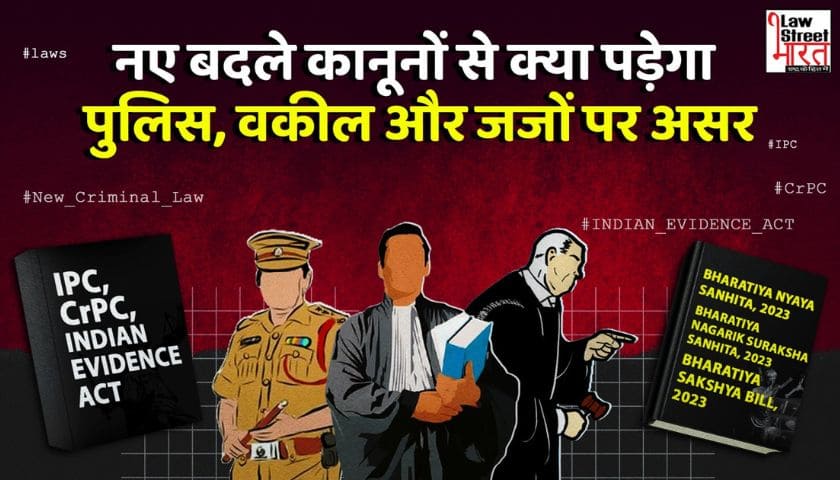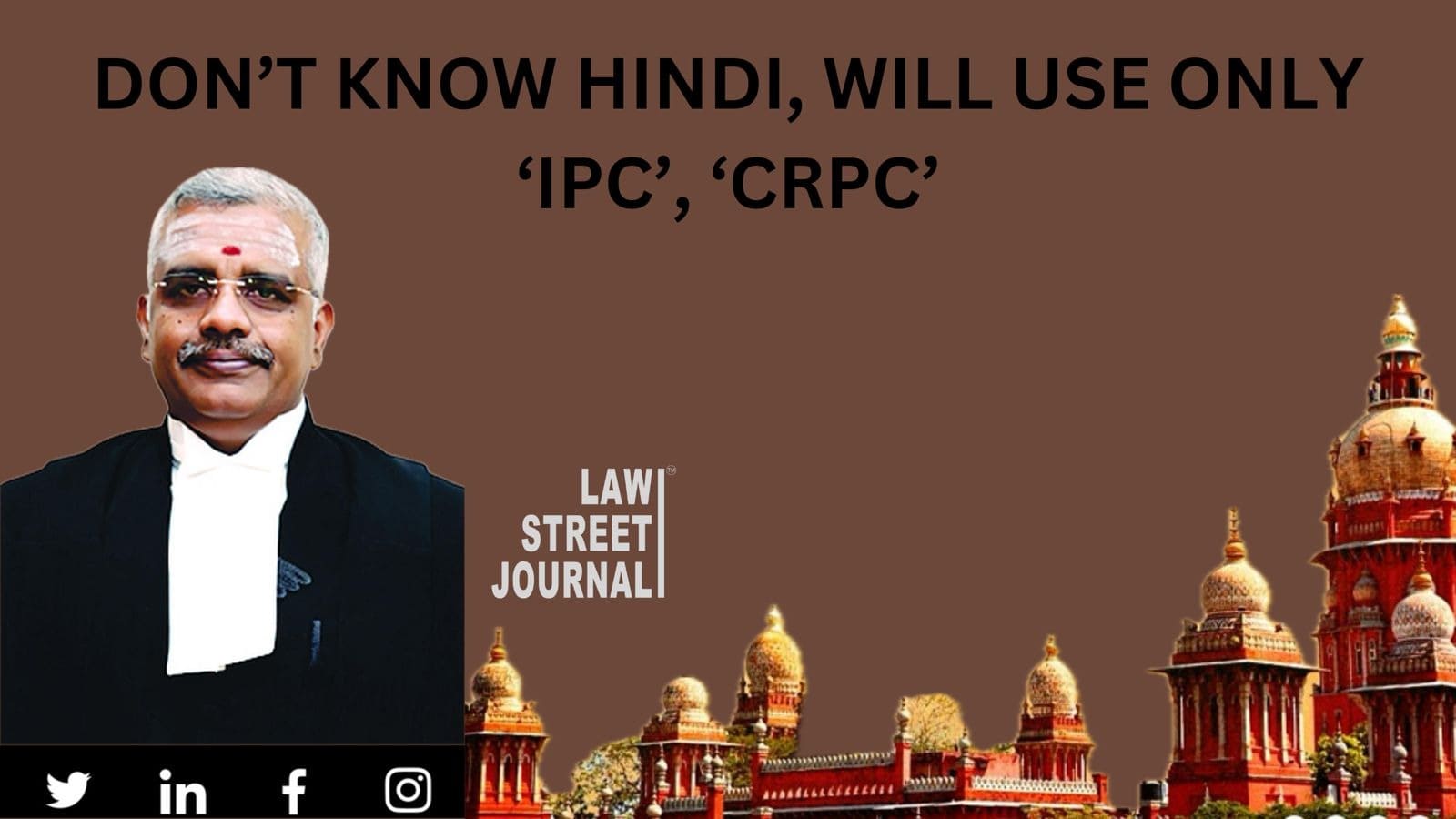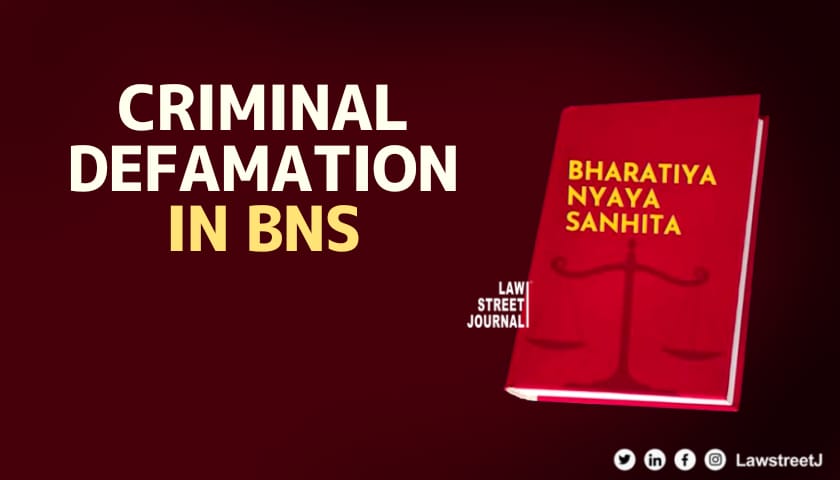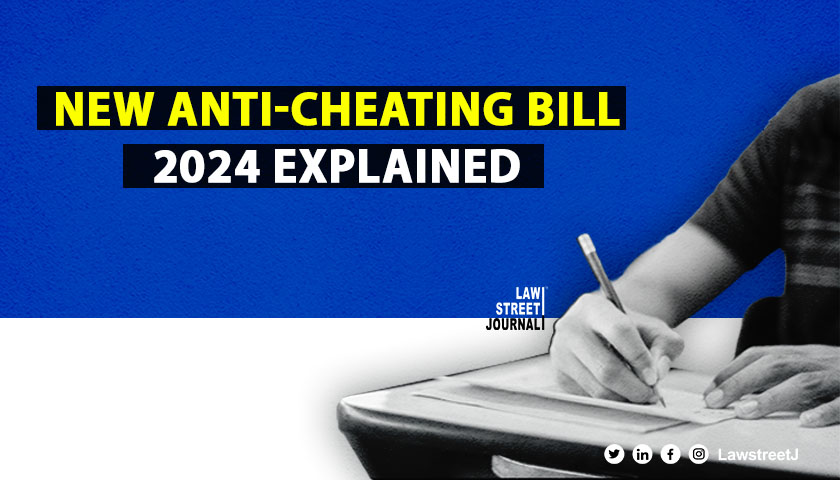New Delhi: The recently introduced criminal laws have been not only been passed in complete haste but passed without adequate deliberation, and consultations with all stakeholders before even introducing such a Bill in the House of Parliament. The fabled House of People was indeed misled wherein the call to war was a complete upheaval of Indias colonial heritage vis--vis the previous criminal enactments. Whilst these crucial bills have been passed in an autocratic and authoritarian manner, the irony is that a sizeable portion of the provisions have been copy pasted from the erstwhile criminal legislations, defeating the very agenda behind their call to war. Though their agenda was to castigate Lord Macaulays brainchild, yet the new legislations are infested with Lord Macaulays progeny so much so that the very scheme of chapterization, placement of provisions and overall scheme of legislation is identical. The Bharatiya Nyaya Sanhita (BNS), the Bharatiya Nagarik Suraksha Sanhita (BNSS), and the Bharatiya Sakshya Adhiniyam (BSA), 2023 are set to replace the Indian Penal Code 1860, the Criminal Procedure Code 1973, and the Indian Evidence Act 1872, respectively, with effect from July 1, 2024. These new criminal laws would govern every aspect of a citizens life, daresay, it is being passed by the very government which was elected to majority by the citizens themselves.
The Much ado about nothing legislations would definitely mark their presence in this dark hour of the democracy due to the incongruency with the foundational principles and ideologies of our Constitution and in extenso the Indian Democracy. Specifically, in the BNSS, which is the procedural law introduced in place of the Criminal Procedure Code, 1973, imperatively the procedural safeguards are a constitutional guarantee, which have been clearly flouted and violated by resorting to such anti-democracy tactics/actions. Laws passed in haste and without any thorough scrutiny may contain ambiguities or inconsistencies, leading to implementation challenges and legal disputes. This can result in unintended consequences and undermine the rule of law.
For instance, when the new set of legislations were passed, almost one hundred Members of Parliament of Lok Sabha were already suspended and a total 146 MPs of both the Houses were thrown out of the ongoing winter session of the Parliament since December 14, 2023 due to Oppositions demand for a statement from the union home minister over the 13th December Security breach incident which happened in the Parliament in 2023. This has been the highest record of the number of MPs suspended in a single session in the history of Parliament since independence. The real reason behind such suspension of Members of Parliament now becomes amply clear as they wanted the new criminal laws to be immediately passed to avoid the tough task of facing any debates, questions, deliberations and basically without any confrontation from the opposition. This incident clearly is a clear indication that our democracy is heading towards a very unhealthy arena. This reflects the serious institutional weakening of our administration, malfunctioning of our governance and political system has just begun. As we observe this from an outsiders perception, it seems as if the Parliament has been converted into a zone of conflict, where the established norms of discussion and deliberation are being conveniently sidelined. There are several dimensions of this ongoing turbulent political crisis owing to the introduction of these new criminal laws which cannot be neglected and hence, some aspects are being discussed as follows:-
IDENTIFIABLE FACETS OF THE ONGOING POLITICAL CRISIS:
1. Decline of Legislative discussion: The idea of legislative discussion has lost its political significance. Parliamentary debates in recent years shows that MPs always adhere to party-line to make any comment, criticism or observation. These remarks are often delivered in the form of a political speech, which usually does not determine the outcomes of actual legislative business. The parliamentary discussion therefore turns out to be a collection of unrelated speeches, disruptions and sloganeering.
2. Professionalisation of politics: Post-colonial Indian politics inherited values from the national movement and democratic politics was defined as a form of social service in the early decades after Independence. However, recent electoral competition uses factors as caste, religion to garner votes and regional identity is recognised as a powerful tool. Politics is now being seen rather differently as a profession to gain power and achieve upward mobility. This new form of competitive politics deteriorate the intellectual aspect of political parties. There is an enthusiasm to embrace the dominant political narrative for electoral viability and for wielding power. The intellectual bankruptcy of the political class does not allow it to generate new political ideas and imaginations. As a result, the level of legislative discussions is compromised and disruptions become the acceptable norms of doing politics inside Parliament.
3. Decline of political morality: The Constitution expects legislators to evolve a political value-system so as to make themselves collectively accountable and responsible. The manner in which the Rules to conduct business of legislation have been invoked this time, it is deeply problematic. Their imposition without any reference to larger democratic principles makes them politically inappropriate and logically unsustainable.
Sanskrit names for the new criminal laws :
Under Article 348 (1) (b) of the Constitution - "It is mandatory that all Acts passed by the Parliament shall be in English. Although the names of the three new laws are in Sanskrit, which violates Article 348 of the Constitution. Also, the new laws are almost same as the old laws and amendments here and there could have sufficed the purpose. However, the autocratic Government has imposed a legislative mayhem with the legislative scheme of sections by interchanging their places but keeping their contents intact which is just like serving old wine in a new bottle. It only makes one wonder- What was the Government thinking? Why was there a need to fix a problem which never existed in the first place?
The use of Sanskrit names for the new criminal laws raises questions about adherence to this constitutional provision. While the text of the laws remains in English, the titles being in Sanskrit could be seen as a symbolic deviation from the norm prescribed by Article 348(1)(b).
The whole agenda of the said legislations being a colonial reminiscent is fundamentally obtuse, more so with regards to the Criminal Procedure Code, 1973 which was passed much afterwards, and in fact it was the criminal procedure code of 1894 which was colonial. In fact, history could not have been clearer in this regard, wherein the Law Commissions from 1961 to 1973 which sieved all laws which were a dire reminder of Indias sordid colonial past. So, if the law-makers couldnt fact-check this issue in the first instance, I daresay I have little hope that the new enactments would reap any positive outcomes.
Implications:
Using Sanskrit for the titles might be viewed as a symbolic gesture towards cultural heritage. However, from a legal standpoint, strict adherence to constitutional provisions is essential to maintain consistency and avoid setting precedents that could lead to confusion or ambiguity in the legal system. English serves as a lingua franca in India's diverse linguistic landscape, ensuring that laws are accessible and comprehensible to a broad audience, including legal practitioners, scholars, and the general public. Deviating from this could affect the accessibility and clarity of legal texts.
Similarity to Old Laws and Structural Changes:
The new laws are essentially the same as the old ones, with minor amendments that could have been incorporated into the existing statutes without the need for entirely new legislation. If the new laws largely replicate the old ones, it raises questions about the necessity of enacting new laws instead of making targeted amendments. This approach might be seen as inefficient and potentially confusing.
Structural Changes:
Reorganizing the sections without substantive changes to their content can lead to confusion among legal professionals and the judiciary who are accustomed to the previous structure. It can complicate the interpretation and application of the law.
The perception of a "domineering attitude" suggests a desire to mark a significant, albeit superficial, departure from the past. This could be interpreted as a political move to assert authority or to create an impression of substantial reform where there may be little.
Practical Implications:
- Legal Continuity and Training: Legal practitioners and law enforcement agencies need continuity and stability in the legal framework to effectively apply and enforce laws. Frequent and superficial changes can disrupt legal education and training.
- Public and Institutional Trust: Consistent and transparent legal processes build trust in the legal system. Perceived unnecessary changes might lead to skepticism about the government's motives and the actual benefits of the new laws.
Use of ambiguous language & broad terms:
The employment of ambiguous language seems intentional, autocratic and overall unnerving owing to the chilling effect the said ambiguity is said to ensue. Broad terms being used in the three criminal laws. For example, the replacement of "sedition" with "subversive activities". Section 103 of Bharatiya Nyaya Sanhita (BNS) has two sub-sections for two distinct classes of murder but having the same punishment. Also, with respect to the increased detention period in the new law has also been an issue of debate and discussion. For example, under Section 187 (2) of the Bharatiya Nagarik Suraksha Sanhita, it is proposed that the period of detention without charges shall be extended from the current 60 days to 90 days, which raises questions of safeguarding individual rights and potential misuse of law.
Replacement of "Sedition" with "Subversive Activities"
The term "sedition" is replaced with "subversive activities" in the new law. The constitutionality of Sedition was actually challenged by way of a Writ Petition through S.G. Vombatkere, a retired Army General, before the Supreme Court of India, joined by several petitioners in 2021 wherein a 3-Judge Bench referred this matter to a Constitution Bench of 7 Judges and when this is sub-judice, how could the new laws enact sedition by changing it to Subversive Activities. The question here is who are they trying to fool? Why are the public being misled into believing the government is doing them good by bringing in such laws.
The term "subversive activities" is broad and could encompass a wider range of actions than "sedition," potentially leading to misuse or overreach by authorities. Broad and vague terms can be used to suppress dissent and target individuals or groups perceived as threatening by those in power. Clear, narrow definitions are crucial for protecting freedom of speech and expression.
Issues in the Section 103 of the BNS:
Section 103 of the BNS has two sub-sections for distinct classes of murder but imposes the same punishment for both. This lack of distinction in sentencing fails to account for the varying degrees of severity and circumstances surrounding different types of murder. Effective justice systems recognize the varying degrees of culpability and circumstances in criminal acts. Sentencing should reflect these differences to ensure proportionality and fairness. Ambiguities in the classification and sentencing can lead to challenges in court, with defendants arguing against the fairness and appropriateness of their punishment.
Increased Detention Period:
The Bharatiya Nagarik Suraksha Sanhita has extended the period of detention without charges from 60 to 90 days. This raises significant concerns about safeguarding individual rights and the potential for misuse of the law. Extended detention without charges can violate fundamental human rights, particularly the right to a fair trial and protection from arbitrary detention. Increasing the detention period can lead to potential misuse by authorities to hold individuals without sufficient evidence, undermining the principles of justice and due process. The extension necessitates robust judicial oversight to prevent abuse and ensure that detentions are justified, transparent, and subject to regular review.
Loopholes in the New Laws are being discussed herein below in a nutshell:-
a. Police Authority and Detention: The bills grant extensive power to police officers and extend detention periods without charges from 15 to 60 or 90 days, endangering civil liberties and increasing the risk of abuse.
b. Ambiguity in Anti-Terror Laws: Confusion arises from overlapping anti-terror regulations, leaving significant discretion to officers without clear guidelines.
c. Proportionality in Sentencing: The laws fail to distinguish between different degrees of offenses, such as treating mob lynching and murder identically, which could lead to disproportionate sentencing.
d. Redundant and Overlapping Provisions: Some offenses, like corruption, are covered under multiple laws, causing redundancy and potential legal conflicts.
e. Reintroduction of Unconstitutional Sections: Sections previously struck down by the Supreme Court, such as those related to sedition, are reintroduced, creating legal ambiguity.
f. Forensic Support: While the bills increase the use of forensics, there are concerns about the accessibility and capacity of forensic facilities.
g. Discretionary Power on the Executive: A critical provision grants Station House Officers (SHOs) the discretion to decide between conducting a preliminary inquiry or registering a First Information Report (FIR) for certain offenses. This transfer of decision-making power from the judiciary to the police could lead to corruption and political influence, undermining the fairness of the justice system. Prima-facie satisfaction was the sole domain of the judiciary, and now the same has been relegated to the SHO for offences between 3-7 years whether an FIR is to be registered or not. In a way this institutionalized corruption, increases political clout and it would make the bureaucracy the be-all and end-all even in situations wherein the crimes are of grave nature. I ask myself this question, what is the need for a parallel justice system? The answer is simple, its because the Indian Judiciary System is Independent, Impartial and is not at the beck and call of the Executive.
While contemplating upon this miserable overhaul of criminal laws in favour of the police officials, I feel obligated to ask myself such questions which are answered nowhere in these laws --- Why police officials are being given such unbridled powers where they can arrest without a warrant from a magistrate or decide if an arrested person can be put in handcuffs? Wouldnt unwarranted exercise of these unrestricted powers by the police lead to a grave violation of the procedural norms and infringement of human rights in the long run? Wouldnt that promote a sense of arbitrariness and unbothered dictatorial attitude among the police officials and lead to a direct attack upon our democratic society? Suddenly, the common Hindi adage came to my mind which states that Jiski Laathi Uski Bhains and this simply applies to the police officers of our country after these new laws are being implemented.
Pondering over this deplorable situation, I do realize that the new criminal laws have bestowed upon the police unfettered powers without any justification, and all of that appears to be completely unrestricted and unaccountable. Previously, the Judiciary, being an independent organ of the government was able to intervene and ensure that police is not able to act in an arbitrary and authoritative manner. The overhaul of the laws has resulted in the police taking the law in its own hands and, blurring the distinction between the three organs of government and depriving the judiciary of its inherent power. The police have been given discretion on whether to register an FIR or not just based upon a preliminary inquiry which can prove to be a catastrophic law for the powerless majority of country where their helpless voices against injustice can be easily crushed at the hands of the police administration at a very early stage itself.
And these endless questions never stopped and kept buzzing continuously in my head like Why the role of our judiciary keeping a check upon the exercise of powers by the police officers is being been sidetracked? Why the role of the judiciary in upholding fundamental rights and ensuring fairness towards the accused is being jeopardized by these laws? Why all of this is even happening without any need for such changes?
h. Impact on Lower Courts and Magistrates: This mindset of discretionary power and its potential misuse can filter down to lower courts and magistrates, leading to lengthy detentions without trial. Magistrates might become more inclined to detain individuals based on preliminary inquiries, resulting in prolonged periods of incarceration without proper judicial oversight.
THE WAY FORWARD:
There is a need to strike a balance between deliberate disruption and raising important issues. Opposition members should play a constructive role in Parliament and they should be allowed to put forward their views and express themselves in a dignified manner. We need to focus and address the broader challenges in the functioning of the Indian Parliament, including issues related to representation, responsiveness, and the need for procedural reforms.
The Democracy thrives on public trust in institutions, particularly Parliament. However, this trust falters when constituents witness their representatives not being able to voice their concerns in the temple of democracy due to their suspension in bulk.
If this kind of perception of authoritarianism and arbitrariness of any government with respect to the legislative process persists in the eyes of the public, then in the coming future, it can definitely lead to disillusionment and discontentment of the masses against this manipulative interplay happening between the parliamentary and political systems in the long run. Ensuring that laws are passed in a transparent and inclusive manner is crucial for maintaining public confidence in democratic institutions upholding the guiding principles and ideals of the Constitution of our country. There is a need to take into account the whole situation and mindfully assess the concerns of our fellow voters who believe in parliamentary system to protect, uphold and nurture democratic values in the best way possible. The manner in which the new criminal laws were passed is going to have several serious and severe complications for the sustenance of stable legislative process and future of democratic governance. Ensuring that laws are enacted through a transparent, inclusive, and deliberative process is essential for their legitimacy, effectiveness, and public trust.
CONCLUSIONS AND RECOMMENDATIONS:
With the gratuitous advent of these new criminal laws, the litigant is left to meander between the old and the new, and the overall justice dispensation machinery is yet to come to terms with the new system of apparently prompt justice. It is vital that that all aspects of new laws, including their titles, comply with Article 348 (1)(b), reinforces the rule of law and prevents any potential legal challenges or public confusion. Additionally, the focus should be directed towards substantive changes rather than superficial reorganization and complete upheaval. Amendments to existing laws should be targeted and well-considered to address specific issues without overhauling familiar structures unnecessarily. Similarly, communication and engagement with legal experts, academicians, eminent jurists, stakeholders, and the public in the legislative process must be undertaken to ensure that reforms are meaningful and widely understood. Transparency in the legislative process helps to maintain public trust and institutional credibility. Our aim should be to maintain clarity and accessibility in legal texts to ensure that laws are easily understood and applied by all sections of society, including legal practitioners and the general public.
The new criminal laws, with their discretionary powers and impact on judicial processes, pose significant risks to the integrity and efficiency of the Indian Criminal Justice System. Addressing these issues requires the appointment of special judges, establishment of fast-track courts and reforms in judicial appointments and tenure. Further, ensuring fairness and efficiency in law enforcement and judicial processes is crucial for maintaining the cherished freedoms of the country.
In my personal opinion, I perceive that the whole idea of the revamp of the existing criminal laws and the framing of the new criminal laws, without any substantial changes was completely futile and superfluous and it has only contributed to confusions and created an unnecessary additional mess for the Bar and the Bench alike. Incorporating several amendments here and there, would have served the purpose and led to the required positive changes in our democratic society. However, instead of allocating public funds of the country towards the formulation of these new criminal laws, I strongly recommend that it would have been much better, if the same would have been directed towards the improvement of the legal infrastructure of our country in order to increase the efficiency of our judicial systems which includes better internet facility and connectivity in all the courts of the country, initiation of fast-track courts, organizing evening courts in order to adjudicate upon different categories of cases (pertaining to different Acts) exclusively and in the most effective manner to reduce the count of pending cases in court all over the country. Further, I suggest that remarkable initiatives could have been taken towards the appointment of State-level judicial committees to assess the real-time shortage and unfilled vacancies of Judges widely prevalent in many states of our country and take appropriate steps to bring some conscientious reforms in the system of judicial appointments and existing tenure of the Judges at all levels. Efforts could have been undertaken to ensure that the shortage of well-qualified Judges in many courts is being rectified by the appointment of well-deserving and meritorious candidates so that they work towards the pursuit of justice relentlessly and deliver selfless diligent service towards the betterment of our judiciary. I truly believe that it would have served as a special boon and a powerful catalyst driving us towards a positive transformative phase and an unprecedented direction which was never possible in the long history of 75 years of our judicial system manifesting in a thousand positive consequences and outcomes!

